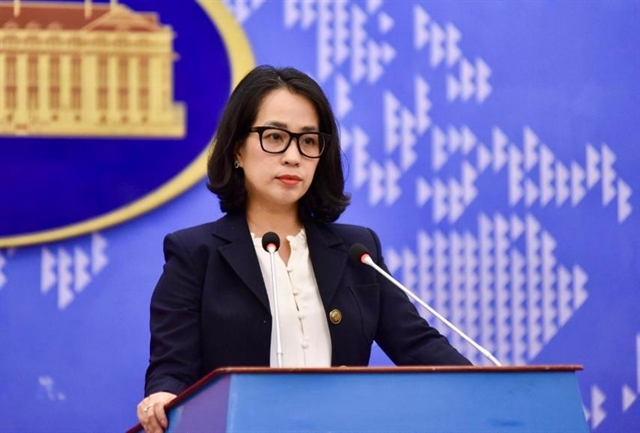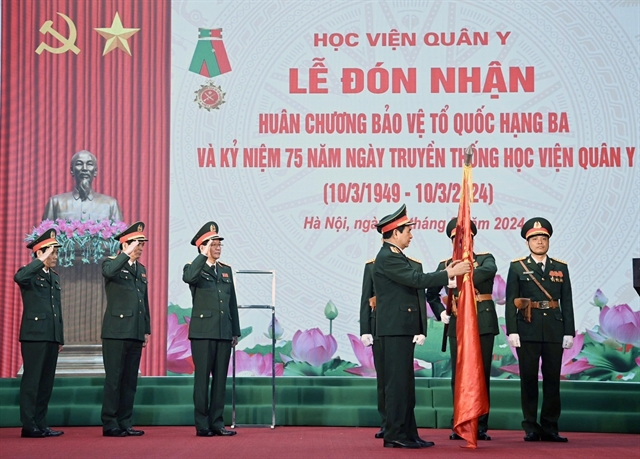 Politics & Law
Politics & Law

 |
| Minister of National Defence, General Phan Văn Giang (third, right) attaches the Third-class Fatherland Defence Medal to the Military Medical Academy's traditional flag on Friday morning in Hà Nội.—VNA/VNS Photo |
HÀ NỘI — The Military Medical Academy was told on Friday to have a long-term development strategy to become a regional and international medical training, research, application and treatment centre.
Minister of National Defence, General Phan Văn Giang made the order when he attended a ceremony of the academy to receive the Third-class Fatherland Defence Medal and celebrate the 75th anniversary of the academy's traditional day (March 10, 2024) in Hà Nội.
Giang said that in the short term, the academy had to innovate strongly, improve the quality of training and scientific research associated with medical examination and treatment as well as healthcare to become Việt Nam's leading multidisciplinary health-science university on par with advanced universities in the region.
"The journey of treating diseases and saving lives, providing health care for officers, soldiers and people is a journey that has no end,” he said.
The hardships of the medical profession are endless, requiring every doctor and medical staff member of the academy to always make efforts, so their knowledge and virtue must be complete, their behaviour must be cautious, he added.
He also said after 75 years of development, the academy had always strived, regardless of hardships and sacrifices, to excellently perform its tasks of protecting, caring for and improving the health of officers, soldiers and people.
When entering the period of Đổi mới (innovation), the academy tackled many difficulties to achieve great strides in training, scientific research, treatment, building the academy into the army's leading medical centre.
The academy had researched and successfully performed the first human organ transplants in Việt Nam and then helped the Central Military Hospital No 103 of the Lao People's Democratic Republic successfully to perform the transplants.
He assessed that the academy had performed well all three key political tasks, consisting of training high-quality human resources for the army health sector and the domestic health sector; researching and developing medical science and technology; and improving the quality and efficiency of medical treatment and examination.
He praised the academy for proactively promoting international cooperation in training and scientific research with countries with advanced and modern medicine, thereby contributing to improving the qualifications and experience of lecturers, doctors and the prestige and position of the academy; establishing a secondary field hospital to participate in the United Nations peacekeeping force in South Sudan as well as participating in the earthquake disaster rescue force in Turkey.
Additionally, the academy's officers and medical staff were ready to go into the epicentre of the COVID-19 pandemic to care for people's health during peak periods of the pandemic.
At the event, Lieutenant General Nguyễn Xuân Kiên, director of the academy, said the academy was established during the fierce period of the resistance war against the French colonialists, teachers and students of the academy had overcome all challenges and hardships to provide examination and treatment for wounded and sick soldiers during the resistance war.
During the progress of building and protecting the nation, the academy had applied and developed new and modern techniques to improve the quality of diagnosis and treatment.
The academy had always been a pioneering and leading unit in successfully performing the first human organ transplants in Việt Nam.
Currently, the academy has 44 affiliated agencies and units, including two hospitals for treatment and clinical practice (Military Hospital No 103, Lê Hữu Trác National Burn Hospital) and the Military Clinical Embryo Tissue Institute.
Notably, the academy is one of the medical facilities that successfully researched and applied many traditional medicine and advanced techniques of world medicine such as endoscopy in diagnosis and treatment, vascular intervention techniques, maintaining and improving organ transplant techniques, in vitro fertilisation, stem cell culture, and burn treatment. VNS

.jpg)


